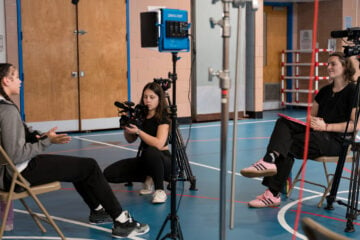Latest Rabbit Ears story: a tear-jerker for its staff
The new owner of Rabbit Ears Productions, Millenium Media, says the company will continue producing radio and video childrens’ stories, despite having fired virtually the entire Rabbit Ears staff (pictured) at the end of April.
Millenium will move Rabbit Ears operations from Connecticut to its home base in Philadelphia and rely on freelancers for future productions, says Chief Operating Officer Robert Weissman. The CD-ROM publishing company bought Rabbit Ears Productions–perhaps best known for its two-year-old Rabbit Ears Radio–from founder Mark Sottnick about six months ago. Sottnick says the firings took him by surprise and he is quite unhappy.
The event shocked those close to Rabbit Ears’ small, family-like operation, and left observers wondering what will become of the enterprise without the staff that was responsible for its critical success. The weekly, star-studded radio program has won two Grammy awards, and in two years built a carriage of 285 stations, making it PRI’s second-most carried program (behind A Prairie Home Companion), according to the network. Rabbit Ears also produced award-winning television programs, books and educational multimedia products such as CD-ROMs.
Sources say Weissman and an unidentified consultant assembled the Rabbit Ears staff for a meeting April 23. “The discussion was, ‘We’re sorry. We have no other options. Effective today, you’re basically fired. And pick up your stuff and be gone,” says Janice Gruendel, Rabbit Ears’ former v.p. for education. “It was stunning.”
The staffers spent the first 45 minutes of the hour-long discussion absorbing the news, she says. The last 15 minutes, they tried to get a handle on “how this was a benefit to the company” or fit into any long-range plan.
Though the Millenium managers “were very nice” in delivering the bad news, Gruendel says, “the way they did this was not planful, and was extraordinarily insensitive.”
The former staff members say Millenium didn’t give them any severance pay, and that their paid health care coverage ended immediately. This made the scenario especially confusing, they say, because Millenium in previous weeks had pressed them to sign a contract stipulating a month’s severance and two months’ health coverage if they were let go. The staff members are “discussing a range of options” in response to what they term a violation of the contract, Gruendel says.
Millenium retained Sottnick and his wife, Doris, co-founder of Rabbit Ears, as creative consultants after the sale. Sottnick associates say something went awry with that arrangement as well, but Sottnick would not discuss it.
Why else?
Weissman says the “restructuring” was done for financial reasons: “Why does any company restructure, reorganize and streamline operations?”
One of Rabbit Ears’ creative staff believes the firings result from a misjudgment by Millenium’s board of directors. “It was well-known that [Rabbit Ears] … needed a cash infusion to keep it going and get its marketing plan in place and make it a profitable company,” the source says. “And it seems like we were just beginning to see the fruits of those labors. They pulled the plug–from a business perspective–at a very foolish time.”
Sottnick gives a slightly different version, saying the company’s cash flow “looked pretty good” when he sold it, although the shop was not debt-free.
Shortly before or on the day Rabbit Ears’ staff was fired, the man who headed Millenium when it bought Rabbit Ears, founder and Chief Executive Officer Richard Rasansky, left the firm. Weissman says Rasansky resigned. Rasansky “brought Millenium to a certain place and decided to move on to the next growth opportunity,” he says. The company is now without a c.e.o.
“Tremendous library of product”
Millenium bought Rabbit Ears Productions in November because it was looking to expand into media forms beyond CD-ROM, Weissman says. He calls Rabbit Ears’ archives–65 titles in print, audio, video and some CD-ROMSs–“a tremendous library of product.”
The company “is very excited about the library … and it is excited about moving the company forward under a different model. That includes continuing programming that exists–instead of using fixed overhead, using free-lancers.” In fact, Millenium has hired some former Rabbit Ears employees on a contract basis, Weissman says.
But Sottnick says Millenium has a staff of two, and questioned how such a company can produce Rabbit Ears Radio when it has no one on staff with radio experience. (Days later, he backed away from that statement, stressing that Rabbit Ears has a bright future, perhaps under Millenium or perhaps a different owner.) For his part, Weissman says: “Keep in mind, Rabbit Ears has always used outside writers, narrators, all kinds of outside groups. There is no reason we cannot continue to do the same.”
Public radio onlookers such as PRI Cultural Programming Director Israel Smith say there’s no reason a media company’s product has to suffer if it relies on contract employees. Sharon Blair, Connecticut PTV’s program development director, agrees. But, she says, the abrupt shutting down of the Connecticut office may leave stations nervous. “[That’s] part of the problem for anyone that’s trying to do business for an organization that has closed,” she says. “Have they gone into bankruptcy? Receivership? Is Millenium continuing to distribute the Rabbit Ears product? I don’t know.” (Although former staffers say the Connecticut office is dark, Weissman says Rabbit Ears “is still operating in Connecticut for now.”)
CPTV is the presenting station for a series of four Rabbit Ears TV programs, “Celebrate Storytelling,” which airs with video offers. Blair is somewhat concerned about the logistics of processing the video orders, but also says Millenium has issued a letter saying it will honor the commitment.
Radio distributor PRI has said it will continue distribution of Rabbit Ears as planned for this season, through September 1996. This distribution will include the planned “Grammy Nominated Summer,” featuring either Grammy-nominated stories or programs that use music by Grammy artists. From October 1996 through June 30, 1997, PRI will distribute 39 weeks of repeat programming, including holiday specials.
Continuation of the series beyond June 30 ’96 will depend on Millenium’s success in lining up funders, Smith says. “The possibility of the show not continuing beyond June is there. As is the possibility we would do another round of repeats,” he says.
Asked about the extent of Millenium’s commitment to the radio series, Smith says anyone whose primary business is “commercial distribution of ideas” understands the value of promotion. “What Bob [Weissman] has been able to grasp very quickly is the value the Rabbit Ears Radio broadcasts deliver in terms of exposure for their brand.”
Fall 1995 Arbitrons show the program has a weekly cume of about 438,000.
Weissman says Millenium will produce a series of Rabbit Ears programs for school use, with Macmillan publishers. This spring, it will release a new line of videos with Microsoft, he says. Also, educational packages in the works at the time of the firings will continue as planned, he says. According to Gruendel, these include:
“Story Lane Theatre,” 27 Rabbit Ears videos attached to mini-documentaries about the creative talent behind the programs. Profile subjects include Lyle Mays of the Pat Metheny Band and vocal artist Bobby McFerrin.
“Footprints Across America,” a compilation of 12 Rabbit Ears videos that together tell the story of America’s development since European settlement. That project comes with a learning guide, and interactive software such as a program that helps kids map, graph and chart territories.
In addition to these projects, Millenium will soon announce “a major opportunity that should be exciting to anyone interested in Rabbit Ears,” says Weissman.





